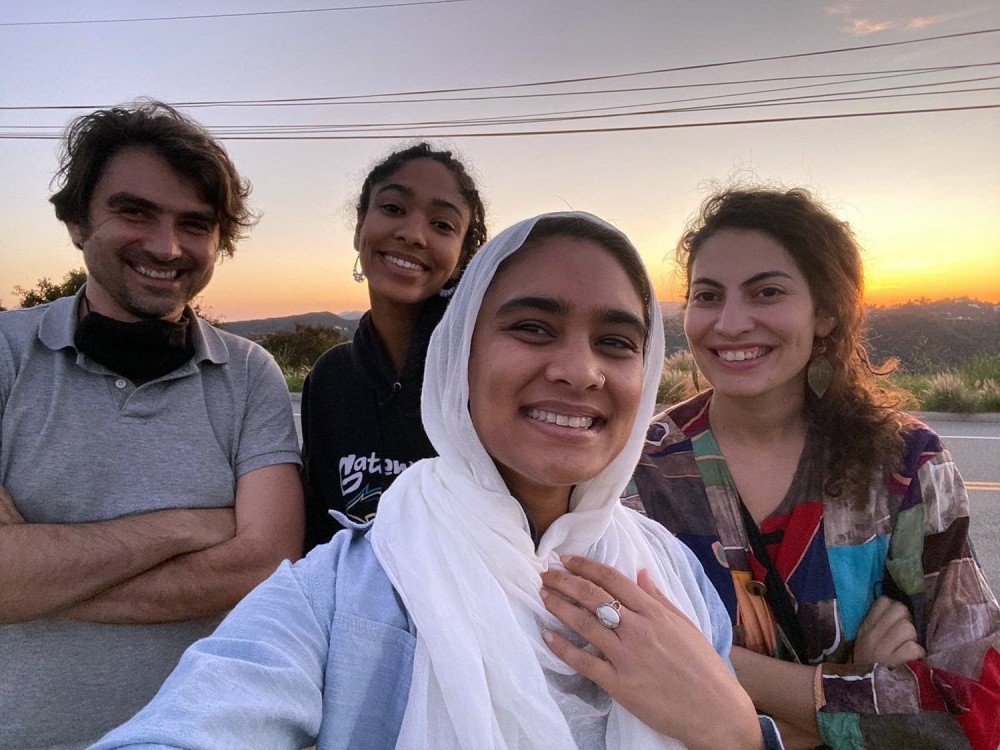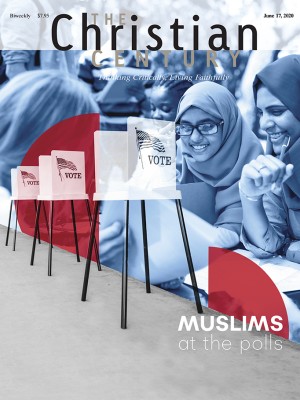Experimental interfaith house adapts to coronavirus pandemic

Hadar Cohen, Ala’ Khan, Maya Mansour, and Jonathan Simcosky arrived as strangers, ready to embark on a new interfaith journey. The four roommates moved into a house in the Koreatown neighborhood of Los Angeles earlier this year.
They come from different faiths: Baha’i, Christianity, Islam, and Judaism. They live rent-free in a new interfaith experiment known as the Abrahamic House, the brainchild of 33-year-old Mohammed Al Samawi, a Muslim man from Yemen who, in his memoir, The Fox Hunt, writes about the threats he endured for his interfaith advocacy.
The catch?
The four roommates, known as “fellows,” maintain their day jobs but agree to live under the same roof in a co-living and cocreating space for one to two years to learn from one another’s traditions—and to organize and host interfaith events and programs for the public.
Read our latest issue or browse back issues.
Their shared mantra: “Gathering, not othering.”
The fellows were selected at the beginning of the year and began moving in around late February. By early March, they were establishing house rules and responsibilities. Then the coronavirus outbreak struck the country.
Now together in lockdown, they’ve adopted new ways of virtually gathering with others while honoring each other’s rituals and traditions. In a time of social distancing, they have had to learn how to live together and to keep each other “safe from potential death and illness,” said Khan, a filmmaker.
The group had to cancel in-person events they had planned for the community. In order to maintain social distancing, they decided not to have guests and friends over. And since they can’t host public events in person, they moved their programming online.
The fellows have hosted an online summit on faith and justice and a virtual symposium on fasting in different faith traditions. Cohen, a feminist spiritual leader and artist, organized a virtual multifaith feminism event in honor of Shavuot, a Jewish holiday when people celebrate wisdom by staying up all night to learn.
On May 14, the Abrahamic House hosted a Zoom screening of Khan’s film documenting Pray Beyond Borders, a binational day of prayer at the US-Mexico border that included Muslim and Christian leaders.
Khan chronicled the six-month anniversary of Border Mosque, a group of Muslims that meets for prayer at the border on the last Sunday of the month. Those prayers coincide with Border Church, or La Iglesia Fronteriza, a Sunday gathering held for the last decade at the border and led by John Fanestil, a United Methodist minister (see “Worship through a wall,” Apr. 22).
This is the kind of storytelling Khan finds inspiring.
“The basis of my faith as a Muslim is to treat people kindly and well and compassionately,” she said. “We have an obligation as faith people to do whatever we can to actively construct a more just world.”
The fellows have also been blogging about celebrating major holidays together. They wrote about cleaning the house in preparation for Passover and taking part in other rituals, like bedikat chametz, with guidance from Cohen. Instead of hiding pieces of leavened bread throughout the house, as the tradition entails, the fellows hid “spiritual chametz” embodying “anything that no longer serves us psychologically, emotionally, and mentally.”
Cohen said that before the pandemic, she was planning also to attend Jewish festivals and home events in LA for Passover. The intimacy of observing this tradition at home with her housemates helped everyone get to know each other better, she said.
“It was one of the first rituals we did together, and it was really beautiful,” said Cohen. “It felt very powerful.”
Simcosky, a book editor who described himself as a “Southern Baptist preacher’s kid,” said the Abrahamic House experience has so far been “educational and enlightening.”
He said he grew up in a culture that “was very interested in converting, conquering, and convincing.”
“That never really resonated with me,” said Simcosky, who now attends an Episcopal church. “As I look at some of the conflicts we’re having in our nation, supremacy is popping up, and I feel like there’s a calling to not conquer or to convince, but to learn and to bless.”
To Mansour, being at the Abrahamic House is a way to help others better understand her Baha’i faith.
“I was really attracted to an opportunity to share and represent my faith that is typically left out of interfaith spaces,” said Mansour, editor of One Report, a spiritually minded publication for young people of all faiths. “I was excited that Baha’is were even listed on the [fellowship] application.”
Khan said the experience of being part of the Abrahamic House has been inspiring. She is glad to know there are other people who invest time and energy in this kind of interfaith work.
Before moving in, she hoped the fellows would all get along and become friends. That hope, at least, has been fulfilled.
“It has definitely panned out very beautifully,” she said. —Religion News Service





